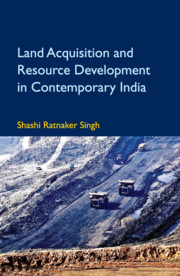Book contents
- Frontmatter
- Contents
- List of Figures
- List of Maps
- List of Tables
- List of Abbreviations
- Foreword
- Acknowledgements
- Part I Theoretical Framework
- 1 Introduction: From Colonial Regime to ‘Welfare State’?
- 2 State, Space and People
- 3 Land, Mines and Minerals
- 4 Land Acquisition and Resource Development in India
- 5 Resource Development and Compensation Issues
- Part II Case Study
- 6 Singrauli: A ‘Space’ of Dependence
- 7 Singrauli: A Development Dilemma
- 8 Administering Singrauli: Governance and Institutions
- 9 Land Acquisition and Its Socio-economic Implications: Field Survey
- Part III Analysis
- 10 Understanding Development
- 11 Conclusion
- Appendix: Memorandum from Mineral-Bearing States
- Bibliography
- Index
5 - Resource Development and Compensation Issues
Published online by Cambridge University Press: 16 October 2020
- Frontmatter
- Contents
- List of Figures
- List of Maps
- List of Tables
- List of Abbreviations
- Foreword
- Acknowledgements
- Part I Theoretical Framework
- 1 Introduction: From Colonial Regime to ‘Welfare State’?
- 2 State, Space and People
- 3 Land, Mines and Minerals
- 4 Land Acquisition and Resource Development in India
- 5 Resource Development and Compensation Issues
- Part II Case Study
- 6 Singrauli: A ‘Space’ of Dependence
- 7 Singrauli: A Development Dilemma
- 8 Administering Singrauli: Governance and Institutions
- 9 Land Acquisition and Its Socio-economic Implications: Field Survey
- Part III Analysis
- 10 Understanding Development
- 11 Conclusion
- Appendix: Memorandum from Mineral-Bearing States
- Bibliography
- Index
Summary
Developments at the state level and the growing interest in resource projects by national and multinational corporations are giving rise to demand for more compensation for dispossessed local communities and to the need for revenue sharing with resource-bearing regions, especially in a federal political system. The lack of clarity about the nature, basis and rationale of compensation and a recognition that issues relating to fair compensation to resource-bearing regions are particularly important in the context of federal democratic polity and have motivated this study.
Legal and Federal Context of Land Acquisition and Resource Development
The right to seek compensation emanates from either principles such as justice, polluter pays, and resettlement and rehabilitation (R&R) policies or from right over the resource itself by absolute ownership, control or usage. Compensation payments need to be supported by legislation or be based on general principles of law such as torts or those developed by judiciary as in the case of compensatory afforestation. Besides their treatment in the constitution and in the laws, the nature of the resource also has an important role in determining any liability that arises for use or depletion of the resource and associated environmental and socio-economic externalities (Divanand Rosencranz, 2002).
Payment to resource-bearing regions and to people in the region needs to address three primary issues, namely, compensation, corrective (and distributional) justice, and deterrence (Segerson, 2002). The goal of achieving corrective justice is to redress a wrong that of distributional justice is to ensure that proceeds are used to make the project-affected families (PAFs) better off than before the project and to improve the lives of the least well-off; and that of achieving deterrence is to regulate future behaviour.
The exercise of the rights to own, control, use and levy a charge on a resource are all dependent on another right of the government, that is, to legislate on these matters. In India, the proprietary title to the minerals vests in the federal states. However, this ownership is subject to the legislation governing regulation and control of mining enacted by the Indian parliament. With respect to minor minerals, the situation is different as states can make their own rules and regulations (Jetli, 2011; Leelakrishnan, 2008).
- Type
- Chapter
- Information
- Publisher: Cambridge University PressPrint publication year: 2021



